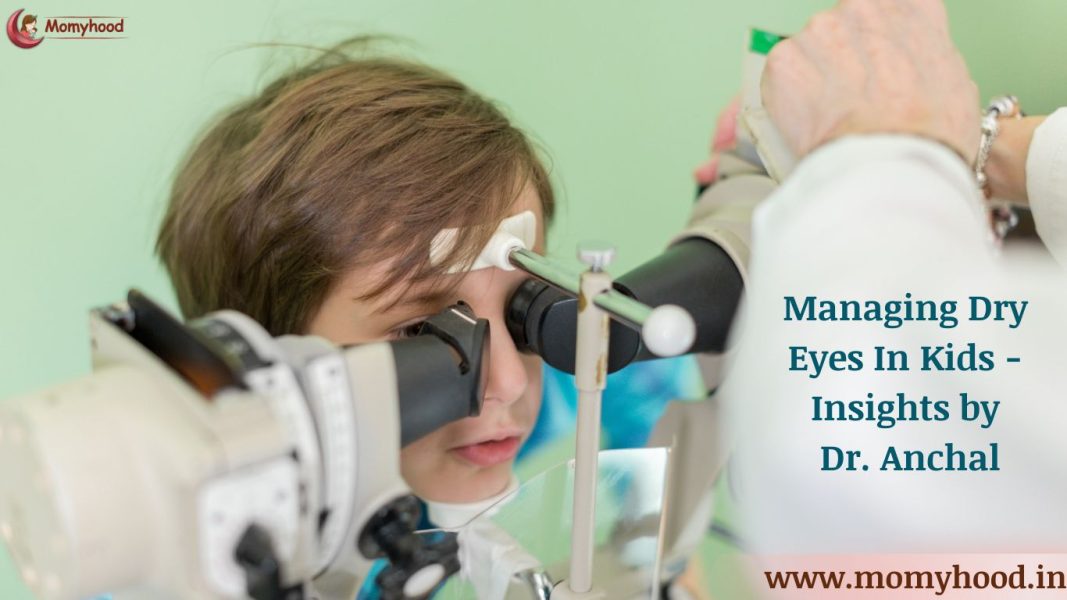As parents in the digital age, it’s essential to recognize the impact of excessive screen time on our children’s eye health when it comes to managing dry eyes in kids. Kids today are exposed to screens from a very young age, whether it’s for educational purposes, entertainment, or communication. While technology has its benefits, prolonged exposure to digital devices can lead to dry eyes, eye strain, and other vision-related issues.
So today, I’m thrilled to have Dr. Anchal, an Ophthalmology Resident, as our guest blogger. With the increasing prevalence of digital devices in our lives, dry eyes have become a common concern. Dr. Anchal has kindly shared her invaluable insights to help us protect our eyes from the strain of excessive screen time.
From the Desk of Dr. Anchal: Managing Dry Eyes In Kids
In today’s digital age, we can’t escape screens – they’re everywhere! While technology has undoubtedly made our lives more convenient, the excessive use of digital devices can take a toll on our eyes, leading to dryness, discomfort, and even vision problems. As an Ophthalmology Resident, I witness the impact of prolonged screen time on eye health every day. That’s why I’m sharing these practical tips to help you manage dry eyes and maintain optimal eye health.
The 20-20-20 Rule
Children learn best by observing their parents. Practice the 20-20-20 rule yourself and encourage your kids to follow suit. After every 20 minutes of screen time, look at an object at least 20 feet away for 20 seconds. Alternatively, you can close your eyes for 2 seconds, open them, and then close them again for 2 seconds, followed by gently squeezing your eyes. This simple exercise helps reduce eye strain and promotes natural blinking, which is essential for maintaining eye moisture.
Blink More Than Clicks
When staring at screens, we tend to blink less frequently when managing dry eyes in kids. Prolonged screen time can lead to reduced blinking, causing dryness and discomfort. So, make a conscious effort to blink more often, which helps spread tears across the surface of your eyes, keeping them lubricated.
Optimal Screen Positioning
Keep your screen at a comfortable distance and slightly below eye level to minimize strain and dryness. Ensure your child’s workstation or screen-viewing area is properly positioned to minimize eye strain. Adjust the screen height, distance, and lighting to create an optimal viewing environment.
Establish Screen Time Limits
Set reasonable screen time limits for your children based on their age and developmental needs. Make sure they take frequent breaks and engage in other activities that don’t involve screens.
📣 Loved what you read? Want to go deeper into conscious parenting? ✨ The Power of Manifestation in Parenting is now available — A soulful guide packed with real-life tools like affirmations, energy shifts, and sleep talk that I personally use with my son, Hitarth. 💛 Start your journey toward calmer, connected parenting today. 🎉 Launch Offer: Only ₹99 (limited-time price!) 📲 Instant download. No waiting. 👉 Grab your copy now!.
Also read: Taking Care of Yourself Is Not Being Selfish
Stay Hydrated
Avoid Direct Air Flow
To managing dry eyes in kids, its important to steer clear of directing air conditioners, heaters, or fans towards their face, as this can exacerbate dry eyes.
Encourage Outdoor Play
Spending time outdoors can help reduce eye strain and promote better eye health. Plan regular outdoor activities where your children can enjoy natural light and give their eyes a break from screens. Also, check this article: Always hooked to digital screens? You may have dry eyes!
Prioritize Larger Screens
Managing dry eyes in kids can be easier if you use a larger screen, such as a desktop computer or laptop for extended work sessions. Mobile phones should be primarily used for communication purposes to reduce strain on your eyes.
Manage Stress and Prioritize Sleep
Stress and lack of sleep can contribute to dry eyes. Practice stress management techniques and ensure you’re getting enough rest each night.
Eat a Healthy Diet
When managing dry eyes in kids, its essential to incorporate plenty of green, leafy vegetables into your diet, as they are rich in essential nutrients that support eye health. Include omega-3 fatty acids, and other nutrients in your diet to support eye health and reduce the risk of dry eyes.
Consult an Ophthalmologist
If you experience persistent dry eye symptoms, don’t hesitate to consult an ophthalmologist for proper evaluation and treatment, which may include medicated eye drops or other appropriate therapies.
Takeaway
Remember, as parents, it’s our responsibility to instill healthy habits in our children from an early age when managing dry eyes in kids. By proactively addressing the potential risks of excessive screen time and implementing Dr. Anchal’s tips, you can minimize the risk of dry eyes and can keep your eyes healthy, comfortable, and well-moisturized, even in the digital age.
Our eyes are precious, and taking proactive steps to protect them from the effects of excessive screen time is crucial. Thank you, Dr. Anchal, for sharing your valuable expertise with us. And to all our readers, let’s prioritize our eye health and embrace a balanced approach to screen time for a happier, healthier life.
Dear readers, stay connected with momyhood.in for more parenting tips and expert advice on various topics related to childcare and family well-being.
Stay well, and keep shining, mommies!
Your comments and shares do more than just support our blog—they uplift the amazing moms who share their stories here. Please scroll down to the end of the page to leave your thoughts, and use the buttons just below this line to share. Your support makes a big difference!



